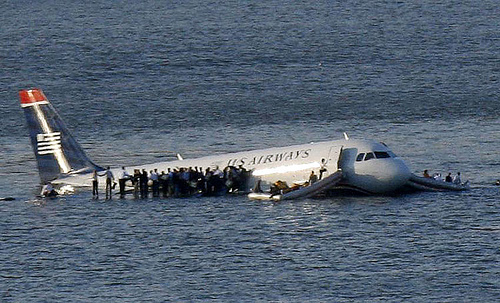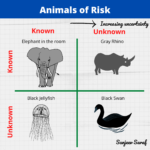In the last two years, I have traveled significantly…have an elite status on three airlines and lots of frequent flyer miles. There are quite a few aspects of a trip that are routine and boring. One such thing is the safety announcement or video at the beginning of each flight. Why do they have it?
Now imagine you are on the US Airways flight that had to be crash-landed in the Hudson. Wouldn’t the instructions about emergency landing on water have been useful? I guess there is a reason landing on water is one of the scenarios in the airline safety announcement.
Source:
The reason frequent travelers ignore the flight safety announcement is normalization of deviation… you have seen the message so many times that it begins to lose impact.
I’m therefore very surprised that organizations believe they can achieve effective safety training by having “canned” refresher e-courses.
These refresher courses are equivalent of airline safety instructions!!! Unless refresher courses are made more engaging, they cannot be effective. If a worker is asked to take the same refresher course year after year, I’m afraid he will fall into a “listen-and-ignore” mode.
In follow-up posts, I will discuss ways of increasing learning impacts from training courses. As an example, take a look at a recent safety instruction video from Virgin America that is different from routine safety announcement.
Did you find the video engaging?







7 Responses
Here is another interesting safety instruction video from air new zealand:
http://www.youtube.com/watch?v=6gF8AY_IfTo
Dr. Saraf, excellent observation on recurring training efficiency. One of the key deficiencies that I have found regarding refresher training is the ignorance to such simple concepts as Bloom’s Taxonomy and his related research as well as the ‘knowledge lifecycle’. I look forward to your follow up on this topic.
At ASSE’s PDC in San Antonio a few weeks ago I delivered a presentation titled “Freshen Up Your Refresher Training” which is directly related to this post. Refresher training very often is terrible and if it is, no one will pay attention. If you get trainees involved and active from the start, especially those who already think they know everything, training will be much more effective. Activities related to class content are a great way to do this.
I am looking to determine if an electrical substation inside a refinery falls under the OSHA Construction PSM standard?
Any help would be appreciated.
Bob
Slightly above average due to visual variety. However, the card reminds me of how engaged my adult daughter with Down’s syndrome find the safety card, over and over again. Quick, graphic, and no monotonous voiceovers.
If you really want to reach the ones who “know it all” you have to use an interactive quiz giving immediate feedback on the accuracy of the answers. This might facilitate a belief that the airline need not give the refresher if the passengers knew the info–thus violating the FAA rules.
I’m therefore very surprised that organizations believe they can achieve effective safety training by having “canned” refresher e-courses. Thanks 😉
The proposition with regard to the question “will your refresher training work” must be that the original training was actually beneficial.
I would take issue with that assumption when it comes to most hazard and risk management (HARM) training currently available.
I’ve been delivering HARM training around the Globe for about 15 years – most of it could be classed as “refresher” insofar as usual audiences are experienced oil and gas or mining employees often with many years of service.
Many times they’ve attended what someone considered to be a HARM training course.
What I usually find is that the majority of partcipants (about 99% I’d say)can’t identify a hazard in the most simple or routine of tasks.
For example, if I ask a group to identify the hazards when driving a car on the highway, virtually no one answers correcctly. Try it yourself with your co-workers.
They’ll say hazards are ice on the road, fog, driving too fast, being drunk, talking on the phone, road works and the like. Now we know that none of those things are hazards. Don’t we?
So to summarize, refresher training is fine so long as the original training was technically correct. If it wasn’t, folks are just getting a double or tripple dose of rubbish. And that’s why people continue to have accidents.
Get the traning right to start with, and then refresher training can really do its job.